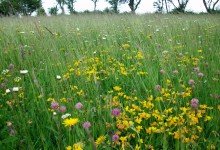A new report about Local Wildlife Sites around the UK has revealed that the habitat quality of 118 (9%) of Dorset’s Local Wildlife Sites have deteriorated significantly in the last five years.
Dorset Environmental Records Centre (DERC) records also show that in the last 10 years, 34 Local Wildlife Sites (called Sites of Nature Conservation Interest (SNCI’s) in Dorset) have been wholly or partially destroyed.
Dorset Wildlife Trust (DWT) contributed to the report, called ‘Secret Spaces’, which has been published by The Wildlife Trusts, and describes a variety of reasons why wildlife sites are lost or damaged, including development, re-planting, ploughing and use of fertilisers. Many sites, such as heathland and unimproved grassland, whilst not deliberately damaged, become smothered in scrub and bracken, which contributes to degradation of the wildlife habitat, if left unmanaged.
DWT’s SNCI manager, Sharron Abbott said, “There are lots of good quality wildlife sites in Dorset, but many are at risk from neglect, damage or development. Many of these sites can be over-looked, but in fact have high quality habitat for a variety of wildlife and are our ‘secret spaces’. A local wildlife site could include a churchyard, or local community space, so it is very important they are cared for, not just for wildlife, but for people too.”
Sharron added, “DWT recognises that many landowners are already working hard to maintain and protect Local Wildlife Sites, but this is increasingly difficult due to the reduction in the Government’s grants to farmers and landowners to enable them to do this.”
Local Wildlife Sites are vital wildlife hotspots and provide important ‘stepping stones’ for wildlife between protected sites like SSSI’s (Sites of Special Scientific Interest). The Wildlife Trusts both locally and nationally will be urging local authorities and developers to fully recognise the importance of these sites in the planning process, and the Government to prioritise land management funding and advisory schemes to help landowners manage these important sites for the benefit of wildlife.







